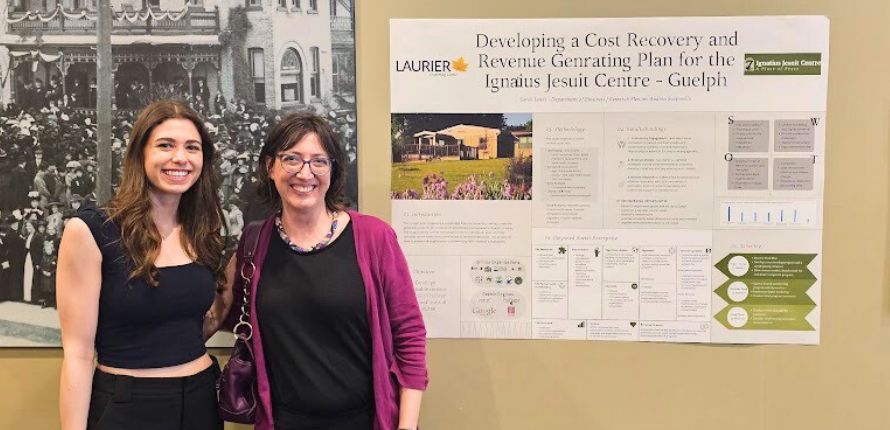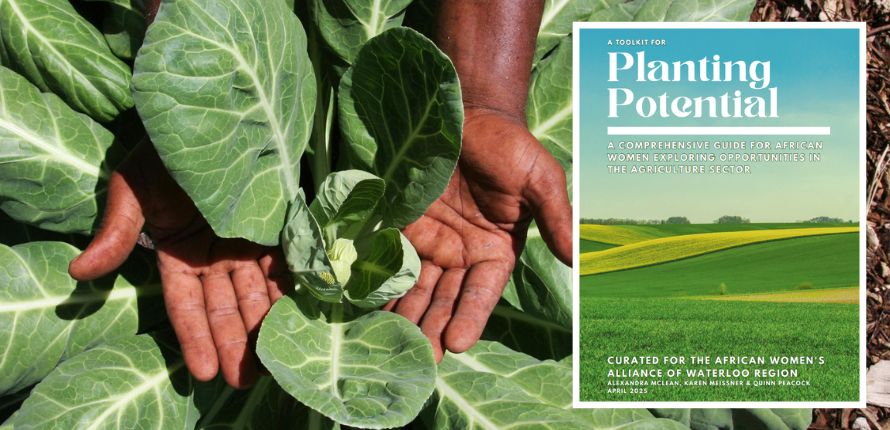We use cookies on this site to enhance your experience.
By selecting “Accept” and continuing to use this website, you consent to the use of cookies.
Search for academic programs, residence, tours and events and more.
Aug. 20, 2025
Print | PDFThrough a growing array of community partnerships, the Faculty of Arts at Wilfrid Laurier University is providing students with experiential learning opportunities to develop future-ready skills while making meaningful contributions to local organizations.
Community partnerships with non-profit organizations, government agencies and businesses allow Laurier students to extend academic learning through hands-on experiences identified by the partner, including case studies, placements and research activities.
In collaboration with Laurier’s Community and Workplace Partnerships team, the Faculty of Arts – celebrating its 100th anniversary in 2025 – offered 18 courses with community-engaged and workplace learning experiences during the 2024-2025 academic year.
Below, learn about how Laurier students are making an impact through experiential learning in Arts courses.
Ignatius Jesuit Centre (IJC) in Guelph, Ontario, partnered with Laurier to explore ways to attract more community members to the programs offered on its 600-acre property to boost revenue amid funding challenges. Emphasizing the connection between spirituality and the environment, IJC’s core programming includes retreats, regenerative farming and conservation initiatives.
Andrea Scapinello, IJC’s director of operations, worked with Laurier Associate Professor Ehaab Abdou and students enrolled in Social Entrepreneurship (SE) 201: Social Challenges and Approaches to Changemaking and Social Entrepreneurship (SE) 300: Developing a Social Enterprise during the 2024–25 academic year to develop ideas for a multi-tier paid membership program to support the centre’s viability.
Offered through Laurier’s Social Entrepreneurship and Innovation minor, SE300 allows students to collaborate with existing social enterprises or design their own. Social enterprises use business strategies to achieve social, environmental or cultural goals.

Sarah Lewis and Andrea Scapinello
Business administration student Sarah Lewis, who took SE201 and SE300, led the IJC project. She researched membership models at similar community organizations, conducted interviews and administered surveys with target audiences before presenting findings from her 30-page report to IJC’s land committee in April 2025. Lewis also created a marketing strategy for the membership program, Friends of the Ignatius Jesuit Centre.
“Sarah was a fantastic fit for the project, and we’re incredibly grateful for the outstanding work she delivered,” says Scapinello. “Her final product was polished and professional — something we can confidently build on. She truly was an asset to our organization.”
Lewis, who is completing the social entrepreneurship and innovation minor, says the experience was a highlight of her university career.
“The hands-on experiences through Laurier’s social entrepreneurship courses have helped me blend my interests in people, community and the environment with my business background,” she says. “Working with IJC helped me discover what truly interests me and where my values align to make an impact as I look ahead to my own career.”
During the winter 2025 term, a group of graduate students in Political Science 627: Policy Research in Action led by Associate Professor Laura Pin worked on a research proposal presented by the African Women’s Alliance of Waterloo Region (AWAWR). The non-profit organization wanted to know more about municipal, provincial and federal policies that could assist newcomer African women in creating smaller-scale agriculture and food-production initiatives.
AWAWR promotes African culture within Waterloo Region and supports African women and families navigating social and cultural barriers. Many AWAWR members have agricultural experience outside of Canada but face challenges working in traditional farming roles locally. Starting their own food-production businesses allows newcomer women supported by AWAWR to grow culturally relevant food, contribute financially to their families and feel connected to community.

"Planting Potential" is a comprehensive resource guide for newcomer women interested in exploring agricultural opportunities.
“Our partners were looking to explore low-barrier, entrepreneurial ways their members could meaningfully engage in agriculture and food production,” says Pin. “Working with AWAWR provided an opportunity for students to dive into agricultural policies, conduct environmental scans and review secondary research to generate solutions that aligned with organizational values.”
Pin’s students, Alexandra Mclean, Karen Meissner, and Quinn Peacock, curated a 20-page guide highlighting Black- and African-led agricultural initiatives and organizations in Ontario and the United States, business models and pathways for agricultural entrepreneurs, and government funding opportunities.
“This collaboration with Laurier students gave us valuable insights into how our members can engage in agricultural initiatives that meet their needs and align with their cultural backgrounds,” says Dr. Fadhilah Balogun, executive director of the African Women’s Alliance of Waterloo Region. “The students’ research was thoughtful and thorough, and we’re excited to explore the possibilities they’ve presented.”
Supportive Housing of Waterloo Region (SHOW) has partnered with several Laurier Arts courses, including Sociology 281: Qualitative Research Methods, Political Science 101: Politics within Borders, Political Science 690: Research Practicum, and Social Entrepreneurship 201: Approaches to Changemaking. Students have completed projects on employment barriers for individuals experiencing homelessness, mapped strategies for expanding housing and partnerships, and researched neighbourhood perspectives on residents of SHOW’s housing units, among other assignments.
“Engaging Laurier students in SHOW’s work is a win-win situation,” says Brian Paul, executive director at Supportive Housing of Waterloo Region. “Their research is sharp, their ideas are creative, and they are professional and engaged in their work. SHOW has benefitted from their support.”
Paul says he sees the benefits of university-engaged projects beyond the career-ready experiences they provide students.
“These opportunities help to shape the next generation of community leaders and advocates,” says Paul. “By partnering with SHOW, I hope students see the human side of housing and continue to help advocate for change.”
In addition to partner-engaged opportunities, Laurier students can participate in experiential learning led by outstanding educators in the Faculty of Arts.